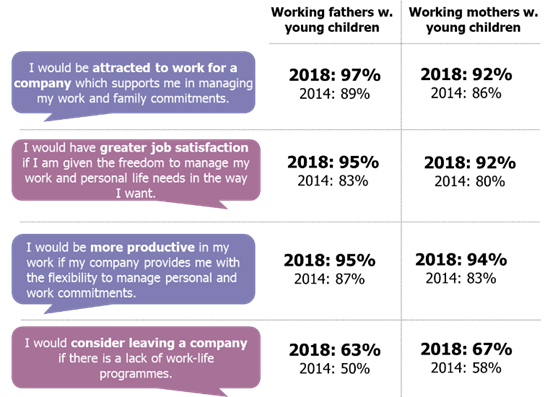Work-Life Harmony: Growing Voice of New Dads
Learn more about working fathers growing desire for work-life harmony.
20 Aug 2019 Articles Work-life harmony Best practices

TAFEP commissioned a survey in partnership with The Straits Times (TAFEP-ST survey) on work-life harmony and flexible work arrangements (FWAs). The survey involved 1,000 Singaporean employees and 511 employers based in Singapore. This is the second such survey being conducted; the first survey was conducted in 2014.
This article is the second of a three-part series on work-life harmony and FWAs, that shares some key findings from the TAFEP-ST Survey.
Stereotypical gender roles have changed over time...
… where we see more fathers choosing to be hands-on in parenting as the responsibility of raising children becomes shared more equitably within families.
This is largely due to the rise in dual-income families in which both parents now have to deal with the dual interests of work and family. So, how have these shifts impacted the work-life landscape in Singapore?
A Louder Voice
While working mothers with young children continue to be main beneficiaries of work-life programmes at the workplace, results from the TAFEP-ST Survey show that working fathers with young children are expressing stronger views about their need for work-life harmony, and the value and impact it has on them.

Figure 1: Attitudes towards work-life harmony
They are also leveraging more FWAs, such as flexi-time/staggered start and end time (34% in 2018, up from 15% in 2014), and telework (26% in 2018, up from 15% in 2014) to manage their work-life needs.
This points towards their growing desire for work-life harmony, and they are actively seeking out solutions to manage their growing responsibilities.
Shift in Societal Norms
The good news is? The findings indicated that an increasing number of employers are acknowledging this shift in societal norms, and adopting a more inclusive approach towards employee life-stage needs, especially for working fathers.
A significant higher percentage of working fathers with younger children shared that their supervisor was open towards FWAs when required. A larger proportion also agreed that their supervisor provided the flexibility to manage their own time and schedule as long as targets and deadlines are met.

Figure 2: Supervisor's perceived attitudes towards FWAs
These results also highlight the need for organisational commitment towards the continuous improvement and innovation of its work-life strategy, in order to meet employees' changing needs. As technology enables flexibility to be implemented in more ways than ever before, employers can review their existing work-life strategies, and identify changes to what employees perceive as beneficial in order to truly enable them to manage work responsibilities alongside their personal and family needs today.
On top of that, creating an environment of trust and respect that allows employees to be transparent about the support they need to manage their responsibilities more effectively will enable them to be more productive, regardless of gender.
Look out for the last instalment in this three-part series! View part one of the series: Evolution of Work-Life in Singapore.
